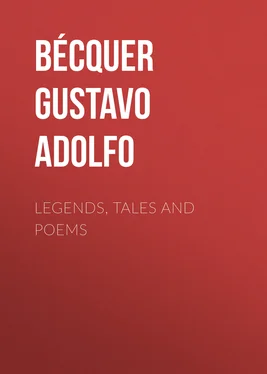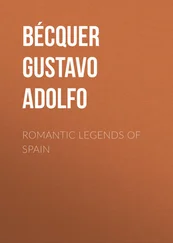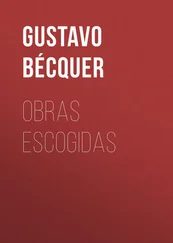Gustavo Bécquer - Legends, Tales and Poems
Здесь есть возможность читать онлайн «Gustavo Bécquer - Legends, Tales and Poems» — ознакомительный отрывок электронной книги совершенно бесплатно, а после прочтения отрывка купить полную версию. В некоторых случаях можно слушать аудио, скачать через торрент в формате fb2 и присутствует краткое содержание. Жанр: foreign_prose, literature_19, foreign_antique, на английском языке. Описание произведения, (предисловие) а так же отзывы посетителей доступны на портале библиотеки ЛибКат.
- Название:Legends, Tales and Poems
- Автор:
- Жанр:
- Год:неизвестен
- ISBN:нет данных
- Рейтинг книги:5 / 5. Голосов: 1
-
Избранное:Добавить в избранное
- Отзывы:
-
Ваша оценка:
- 100
- 1
- 2
- 3
- 4
- 5
Legends, Tales and Poems: краткое содержание, описание и аннотация
Предлагаем к чтению аннотацию, описание, краткое содержание или предисловие (зависит от того, что написал сам автор книги «Legends, Tales and Poems»). Если вы не нашли необходимую информацию о книге — напишите в комментариях, мы постараемся отыскать её.
Legends, Tales and Poems — читать онлайн ознакомительный отрывок
Ниже представлен текст книги, разбитый по страницам. Система сохранения места последней прочитанной страницы, позволяет с удобством читать онлайн бесплатно книгу «Legends, Tales and Poems», без необходимости каждый раз заново искать на чём Вы остановились. Поставьте закладку, и сможете в любой момент перейти на страницу, на которой закончили чтение.
Интервал:
Закладка:
At this time Luis Gonzalez Bravo, a man of fine literary discrimination, whatever may be thought of him politically, was prime minister under Isabel II. He had become interested in the work of Gustavo, and, knowing the dire financial straits in which the young poet labored, he thought to diminish these anxieties and thus give him more time to devote to creative work by making him censor of novels. A new period of calm and comparative comfort began, and for the first time in his life Becquer had the leisure to carry out a long-cherished project, at once his own desire and the desire of his friends: that of gathering together in one volume all his scattered verse and of adding to the collection other poems as well that had not yet seen the light. This he did, and the completed volume so charmed his friend and patron, Gonzalez Bravo, that he offered of his own accord to write a prologue for the work and to print it at his own expense. But in 1868 came the revolution which dethroned Isabel II, and in the confusion that followed the downfall of the ministry and the hasty withdrawal of Gonzalez Bravo to the French frontier the volume of poems was lost. This was a sad blow to Becquer, but he courageously set to work to repair the loss, and with painful effort succeeded in recalling and rewriting his Rimas , which were published after his death in the third volume of his works by his friend Correa.
Becquer, with extreme punctiliousness, tendered his resignation as censor of novels. A pension of 10,000 reals that the government had assigned to Valeriano for the study of national customs was withdrawn, and both brothers were again deprived of permanent employment. They joined forces, and while the one sketched admirable woodcuts for the Almanac Anual of Gaspar y Roig, the other wrote such original articles as Las Hojas Secas , or chafed under such hack work as the translation of popular novels from the French, which language he read with ease, though he did not speak it well. Gustavo had already felt and described the charm of the old Moorish city of Toledo in his Historia de los Templos de España , and in 1869 he and Valeriano moved their little household temporarily to the city of their dreams, with a view to finding inspiration for their pens and brushes, and thus subsistence for their joint families.[1]
[Footnote 1: It was at this time that Gustavo wrote the letter which is published for the first time on page xxxix.]
An amusing account is given by Correa of an adventure that befell the two brothers one night in Toledo as they were wandering about its streets. He says: "One magnificent moonlight night both artists decided to contemplate their beloved city bathed in the fantastic light of the chilly orb. The painter armed with pencils and the writer with his souvenirs had abandoned the old city and on a ruined wall had given themselves up for hours to their artistic chatter … when a couple of Guardias civiles , who had doubtless those days been looking for marauders, approached them. They heard something of apses, squinches, ogives, and other terms as suspicious or as dangerous … and observing the disarray of those who thus discoursed, their long beards, their excited mien, the lateness of the hour, the solitude of the place, and obeying especially that axiomatic certainty of the Spanish police to blunder, they angrily swooped down upon those night birds, and, in spite of protests and unheard explanations, took them to continue their artistic themes in the dim and horrid light of a dungeon in the Toledo jail.... We learned all this in the office of EC Contemporáneo , on receiving from Gustavo an explanatory letter full of sketches representing the probable passion and death of both innocents. The staff en masse wrote to the mistaken jailer, and at last we saw the prisoners return safe and sound, parodying in our presence with words and pencils the famous prisons of Silvio Pellico."[1]
[Footnote 1: Correa, op. cit. , pp. xxi-xxiii.]
In this same year, 1869, we find the brothers housed in modest quarters in the Barrio de la Concepción in the outskirts of Madrid. Here Adolfo wrote some new poems and began a translation of Dante for a Biblioteca de grandes autores which had been planned and organized by La Ilustración de Madrid , founded by Gasset in 1870. The first number of this noteworthy paper appeared on January 12 of that year, and from its inception to the time of his death Gustavo was its director and a regular contributor.[1] His brother Valeriano illustrated many of its pages, and here one can form some idea of his skill as a portrayer of Spanish types and customs. "But who could foretell," says their friend Campillo, "that within so short a time his necrology and that of his beloved brother were to appear in this same paper?"[2]
[Footnote 1: These articles of Gustavo's have not, for the most part, been published elsewhere. There remains for the future editor of his complete works a large number of such articles, which it would be well worth while to collect.]
[Footnote 2: La Ilustración Artística , p. 360.]
Their life of hardship and anxiety was tearing to shreds the delicate health of the two young artists, and on September 23, 1870, Valeriano breathed his last in the arms of Gustavo. His death was a blow from which Gustavo never recovered. It was as though the mainspring was broken in a watch; and, though the wheels still turned of their own momentum, the revolutions were few in number and soon ceased. "A strange illness," says Correa, "and a strange manner of death was that! Without any precise symptom, that which was diagnosed as pneumonia turned to hepatitis, becoming in the judgment of others pericarditis, and meanwhile the patient, with his brain as clear as ever and his natural gentleness, went on submitting himself to every experiment, accepting every medicine, and dying inch by inch."[1]
[Footnote 1: Correa, op. cit. , p. xix.]
Shortly before the end he turned to his friends who surrounded his bed, and said to them, "Acordaos de mis niños."[1] He realized that he had extended his arm for the last time in their behalf, and that now that frail support had been withdrawn. "At last the fatal moment came, and, pronouncing clearly with his trembling lips the words 'Todo mortal!', his pure and loving soul rose to its Creator."[2] He died December 22, 1870.
[Footnote 1: This fact was learned from a conversation with Don Francisco de Laiglesia, who, with Correa, Ferrán and others, was present when the poet breathed his last.]
[Footnote 2: Correa, op. cit. , p. xx.]
Thanks to the initiative of Ramón Rodriguez Correa and to the aid of other friends, most of the scattered tales, legends, and poems of Becquer were gathered together and published by Fernando Fe, Madrid, in three small volumes. In the Prologue of the first edition Correa relates the life of his friend with sympathy and enthusiasm, and it is from this source that we glean most of the facts that are to be known regarding the poet's life. The appearance of these volumes caused a marked effect, and their author was placed by popular edict in the front rank of contemporary writers.
Becquer may be said to belong to the Romantic School, chief of whose exponents in Spain were Zorilla and Espronceda. The choice of mediaeval times as the scene of his stories, their style and treatment, as well as the personal note and the freedom of his verse, all stamp him as a Romanticist.
His legends, with one or two exceptions, are genuinely Spanish in subject, though infused with a tender melancholy that recalls the northern ballads rather than the writings of his native land. His love for old ruins and monuments, his archaeological instinct, is evident in every line. So, too, is his artistic nature, which finds a greater field for its expression in his prose than in his verse. Add to this a certain bent toward the mysterious and supernatural, and we have the principal elements that enter into the composition of these legends, whose quaint, weird beauty not only manifests the charm that naturally attaches to popular or folk tales, but is due especially to the way in which they are told by one who was at once an artist and a poet.
Читать дальшеИнтервал:
Закладка:
Похожие книги на «Legends, Tales and Poems»
Представляем Вашему вниманию похожие книги на «Legends, Tales and Poems» списком для выбора. Мы отобрали схожую по названию и смыслу литературу в надежде предоставить читателям больше вариантов отыскать новые, интересные, ещё непрочитанные произведения.
Обсуждение, отзывы о книге «Legends, Tales and Poems» и просто собственные мнения читателей. Оставьте ваши комментарии, напишите, что Вы думаете о произведении, его смысле или главных героях. Укажите что конкретно понравилось, а что нет, и почему Вы так считаете.












